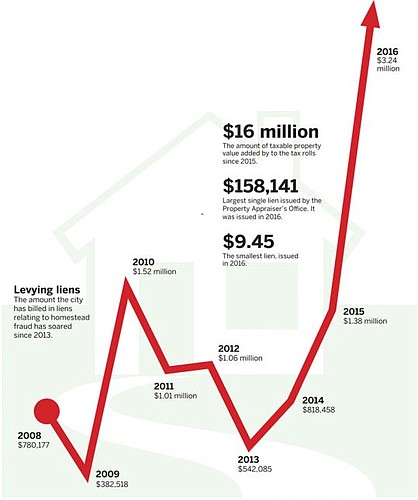
If you are falsely claiming a homestead exemption, the Duval County Property Appraiser is looking for you.
And it’s getting harder to hide.
Since 2015, the appraiser’s office has filed nearly 1,000 liens for $5.1 million against property when owners claimed fraudulent homestead exemptions – and $3.1 million has been collected.
“We’ve been very productive,” said Jerry Holland, property appraiser.
Liens average about $5,000. The largest — more than $158,000 — was filed on waterfront property along Aladdin Road in Mandarin — while the smallest is $9.45.
Under Florida Statute 196, the homestead exemption gives a tax discount on a homeowner’s primary residence by allowing $50,000 of the market value to be exempt from property taxes and $25,000 exempt from school taxes.
Owners are entitled to the exemption if, on Jan. 1 of each year, they have made the property their permanent home or the permanent home of a person who is legally or naturally dependent on them.
It’s fraud when a homeowner claims the exemption when the property isn’t their primary residence, or when the property is used as a rental or when rented as a vacation home for part of the year.
Some people don’t realize that they can only claim one homestead exemption, so if one is already claimed in another county or state, they can’t claim one in Duval County, Holland said.
He said he believes most of the fraud stems from ignorance, but that doesn’t mean falsely claiming the tax discount isn’t costing the city money. Property taxes are Jacksonville’s largest source of revenue.
Underpaying also impacts the revenue of the three Beaches communities and Baldwin (each of the four municipalities collect 11.4419 mills, or about $11.44 per $1,000 of assessed value), the Duval County School Board (7.1170 mills), the St. Johns River Water Management District (0.3023 mills) and the Florida Inland Navigation District (0.0320 mills).
If a property owner is caught, in addition to the back taxes that weren’t paid based on the exemption, there is a 50 percent penalty added and the full tax bill can be collected for as far back as 10 years if that’s how long it is determined the exemption has been improperly claimed, Holland said.
He said when he took over the office in 2015, there was a backlog in the homestead fraud investigation department brought on by several years of city budget cuts that forced staff to work on the issue only part-time.
He has since re-organized the office and now has a team dedicated solely to searching out improper exemptions.
About two months ago, a third-party collection service was added to the fraud investigation effort.
“They are able to cross-reference property records in other states. They find the ones we can’t find,” Holland said.
The company receives a 28 percent commission on what it collects and the Duval County Tax Collector gets 2 percent of the back-tax collection.
“Getting 70 percent of anything is better than getting 100 percent of nothing,” Holland said.
The office has also hired a former Osceola County sheriff’s deputy who has been designated a reserve officer by the Jacksonville Sheriff’s Office to help the investigations.
Holland said there’s no intent to arrest anyone for homestead fraud, but when a police officer contacts a jurisdiction outside Duval County seeking property records, it’s easier to get answers quickly.
“She has a badge. It does give us an edge,” Holland said.
Of the about $3 million that has been collected since the crackdown began, some people took a check to the tax collector soon after they were notified of the lien.
Monthly payment plans are available if the property owner can’t resolve the entire balance immediately — but that comes with 15 percent annual interest on top of the back taxes and penalty.
Others may be notified by their mortgage holder that the city has taken legal action to collect taxes due.
“Lenders don’t like liens on property,” Holland said.
Eventually, the bill will be paid even if it’s not until the property is sold, Holland said.
He estimates it could take about two years to flush out all of the homestead fraud in the county. Then it will be time to go after some other type of tax underpayment.
“I’d be happy if it (homestead fraud) was zero,” Holland said. “Then we’ll investigate something else — maybe tangible personal property tax.”
(904) 356-2466